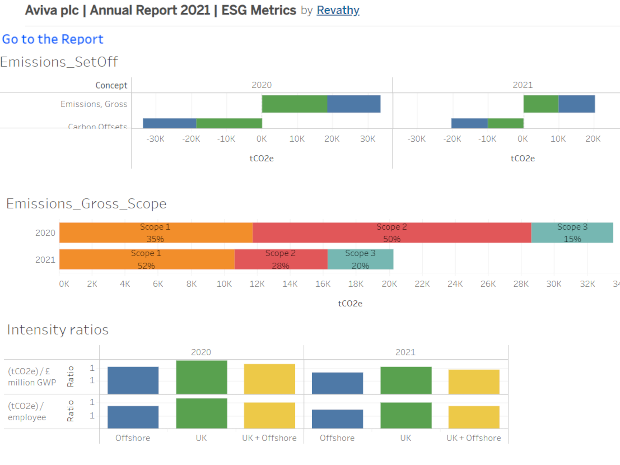UK’s first Inline XBRL ESG report offers exciting new ways to analyse data

We’ve been diving into the analytical possibilities offered by digital environmental, social and governance (ESG) reporting in recent days {Ed: months? years?}. As our regular readers and social media followers may have noted, last week Aviva published its 2021 annual report in Inline XBRL. It is, we believe, the first UK company to digitally tag emissions data – required under the UK’s Streamlined Energy and Carbon Reporting (SECR) framework, but as yet without a digital mandate – as well as a range of other ESG metrics.
What does this kind of reporting mean for investors, regulators, researchers, or anyone else who wants to get a handle on companies’ ESG performance? In short, it makes it much easier for users – including those without a technical background or any special XBRL knowledge – to visualise and compare ESG metrics. XBRL International’s Guidance Manager Revathy Ramanan was able to quickly put together a set of graphs using data pulled directly from Aviva’s report. Information about, for example, the breakdown of emissions types, emissions reductions between 2020 and 2021, and employee pay profiles is easy to comprehend at a glance. Once digital data is also available from other filers, it will also be possible to start to compare companies.
“We’ve never had this kind of data before,” says our CEO John Turner, but thanks to the power of xBRL-JSON interesting results are possible after just an hour or so of experimenting with the data. “Imagine what will be possible once sustainability disclosure mandates are in place, companies start filing, data starts to flow and data scientists get to work!”
The xBRL-JSON format is ideal for data users. It makes it easy to retrieve data and to analyse it using commonly available software tools. And thanks to built-in interoperability, other XBRL formats can be converted into xBRL-JSON for analysis. The Aviva report is a great place to start – or if you’re interested in exploring more, you can grab JSON data from any report in our filings.xbrl.org repository of European Single Electronic Format (ESEF) filings.





